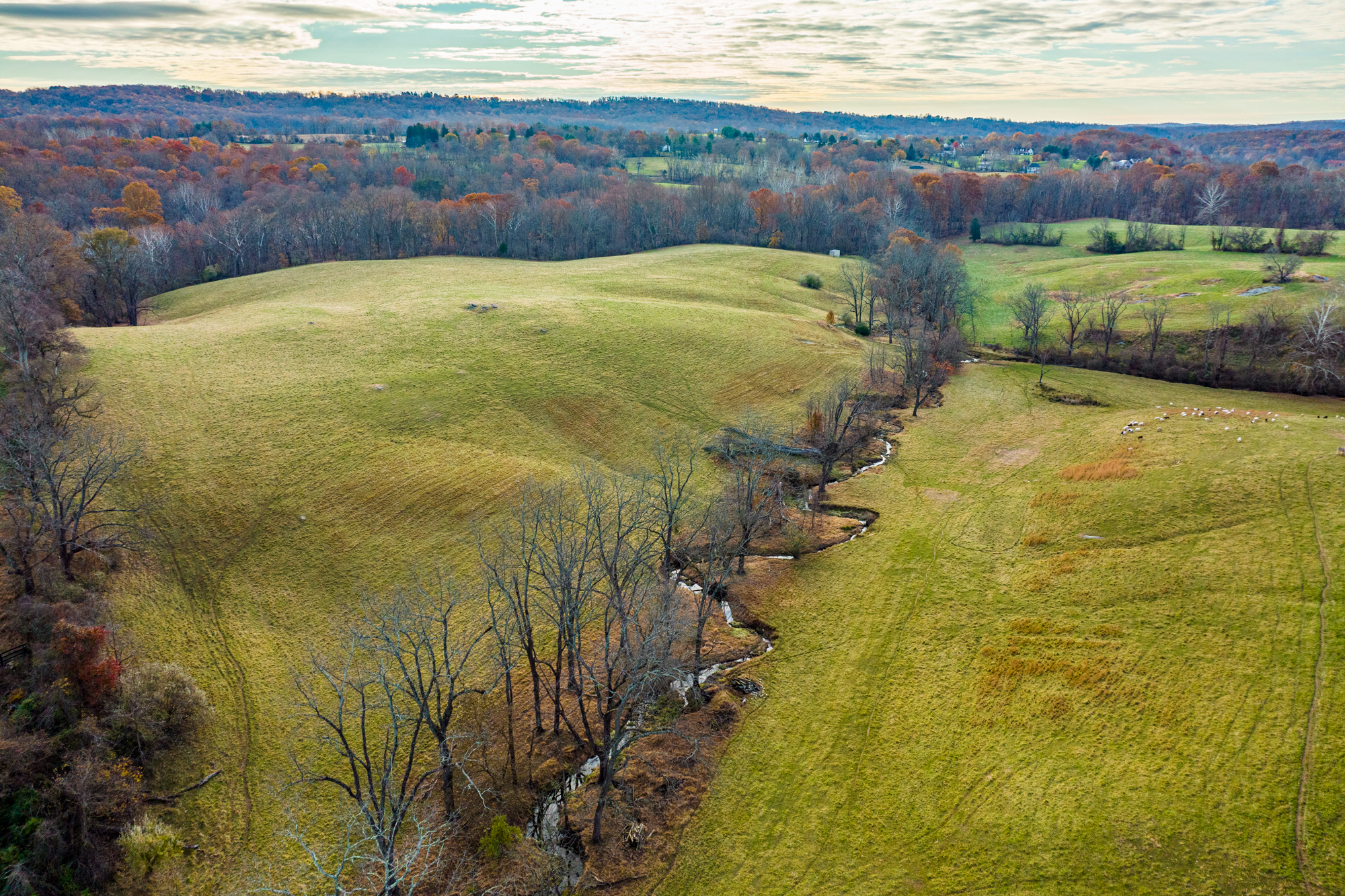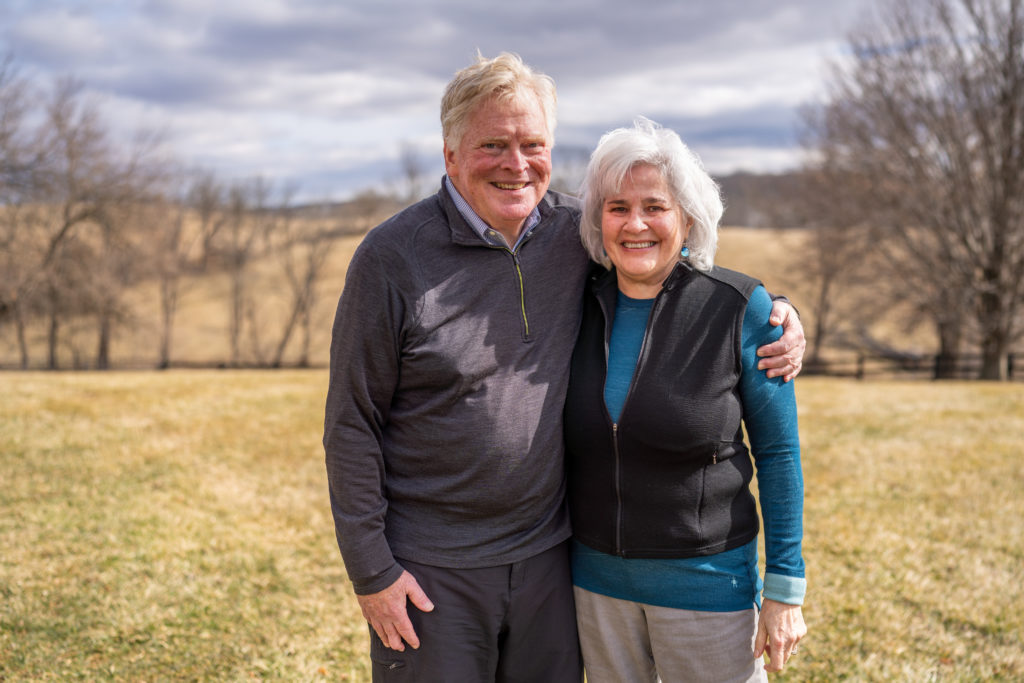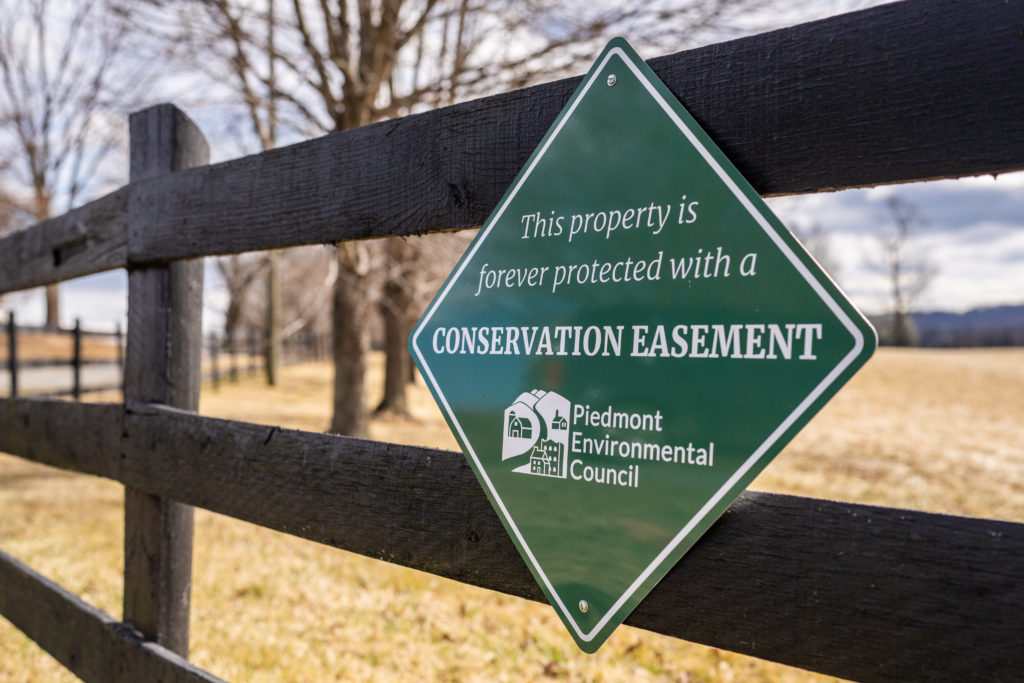“When you get older, you start thinking about what you’ll leave behind, or what you did to make a difference. One of the ways we feel like our lives could make a difference is by doing something like this. We really love this property and have so much history here, and we want to do right by it,” said Susan Holden, sitting alongside husband Patrick on the farm his parents bought in 1958.
In 2021, the Holdens partnered with The Piedmont Environmental Council to permanently conserve their rolling 35-acre farm just south of the historic Quaker village of Lincoln.
Patrick’s memories of this place go back to age six, when his parents permanently moved here from Alexandria in the late 1960s. He grew up on the farm with three of his five older siblings and helped run the cow-calf operation before heading to the west coast for college and the start of his career in environmental sciences. Roughly a decade or so later, he and Susan moved back as a young married couple to build a home on the family property, help run the farm, and care for Patrick’s mother, suffering from advanced multiple sclerosis by then. Their two sons are the third generation of Holdens to live on the land.

Patrick and Susan learned about conservation easement programs years ago, in part thanks to several neighbors, including the venerable Jean Brown, who together had already conserved 1,015 acres within a mile of the Holden’s home. “Both Patrick and I grew up spending a lot of time outdoors, feeling very close with nature and caring about the landscape a lot, and it has always been a goal to preserve this area just as we went on living here,” Susan said. The stars aligned last year, when a number of programs fell into place that not only made donating a conservation easement possible for the Holdens, but will also help them realize their dreams for the future of the land.
First, PEC’s John M. Rowley Goose Creek Land Conservation Fund was able to contribute $5,000 toward the Holden’s stewardship costs, while Loudoun County’s income-based Conservation Easement Assistance Program may cover up to half of their easement costs. “Many people are familiar with the tax savings associated with donating a conservation easement, but there are quite a few expenses as well,” said Hallie Harriman, PEC’s land conservation field representative for Loudoun County. Those expenses include preliminary and post-easement appraisals used to determine the value of the donation for tax purposes, land surveys, attorneys fees, and a stewardship fee that conservation organizations use to care for the land in perpetuity.
Donating a conservation easement means relinquishing most development rights on the land, but within a certain proximity to their existing home, the Holdens’ easement allows for an addition onto the house and outbuildings such as a garage or equipment barn. “We wanted to allow for options that would make this property attractive to our children or to someone like us in the future,” Patrick said. “When we look across the fields, we take great pleasure in knowing it will never be developed and will always look much as it has during our time here.”
The self-described “original granola-eating tree huggers” have also made the decision to focus on managing the property for wildlife habitat, “to bring the land back into balance with nature, to provide habitat for pollinators and birds, as well as maximize carbon sequestration,” Pat- rick said. For their 40th wedding anniversary last year, the Holdens made a plan to plant 40 trees on the property. To help them do that, PEC enrolled the property in its new Potomac Planting Program, which provides qualifying landowners with free technical assistance, project design, materials and labor for the planting of native trees and shrubs along streams and waterways.
“The Holdens’ farm is perfect for the Potomac Planting Program because it’s laced with 2,570 linear feet of small stream tributaries that flow into Crooked Run, which is part of the Goose Creek watershed that supplies drinking water to parts of eastern Loudoun County,” Harriman said.
Avid birders and bee-keepers, the Holdens also hope to bring back many of the grassland birds whose songs once filled the air and to provide new refuge for migrating monarch butterflies and other pollinators. “We’ve always had a pretty healthy meadowlark population, though not in the back field, and the bobolinks we still see sometimes. But when we first moved here, every night in the summer we could sit on the porch and hear the bobwhite quail. And I haven’t heard a bobwhite quail in so long now. We just care about these species and are trying to create a good habitat for them,” Susan said.
They look forward to partnering with the Loudoun County Soil and Water Conservation District and the Natural Resources Conservation Service to convert nine acres of pasture land to native grasses and wildflower meadow, and with the Piedmont Grassland Bird Initiative to delay haying on a portion of the property. Eventually, they hope their land can serve as an outdoor classroom for the First Day School children at Goose Creek Friends Meeting where they attend services.
Within the broader landscape, Harriman said “the property is an important piece of the bigger conservation puzzle and adds to a mosaic of publicly and privately conserved lands in Loudoun. It has running water, is located near a scenic byway, has agricultural soils of statewide importance, and holds some historic remnants, all situated within the Goose Creek Rural Historic District.” The area’s known history goes back to the Manahoac tribes that first used the lands for hunting, foraging, fishing and harvesting, and later the Quakers, whose superb stone masonry and smaller farm parcels still dot the region.
Observing the rolling hills from his front door, Patrick says “It still looks very much the way I remember it growing up, and when we’re gone, this is our gift to the land. We feel very fortunate and blessed to be able to express our values through an action like this. My mother was very environmentally aware and concerned, and she would be thrilled.”
This story appeared in The Piedmont Environmental Council’s member newsletter, The Piedmont View. If you’d like to become a PEC member or renew your membership, please visit pecva.org/join.


